Be very careful what you say. If they get back together it could be bad.
My Son-in-Law Tried to Cut Me Out — I Taught Him a Lesson He Won’t Forget
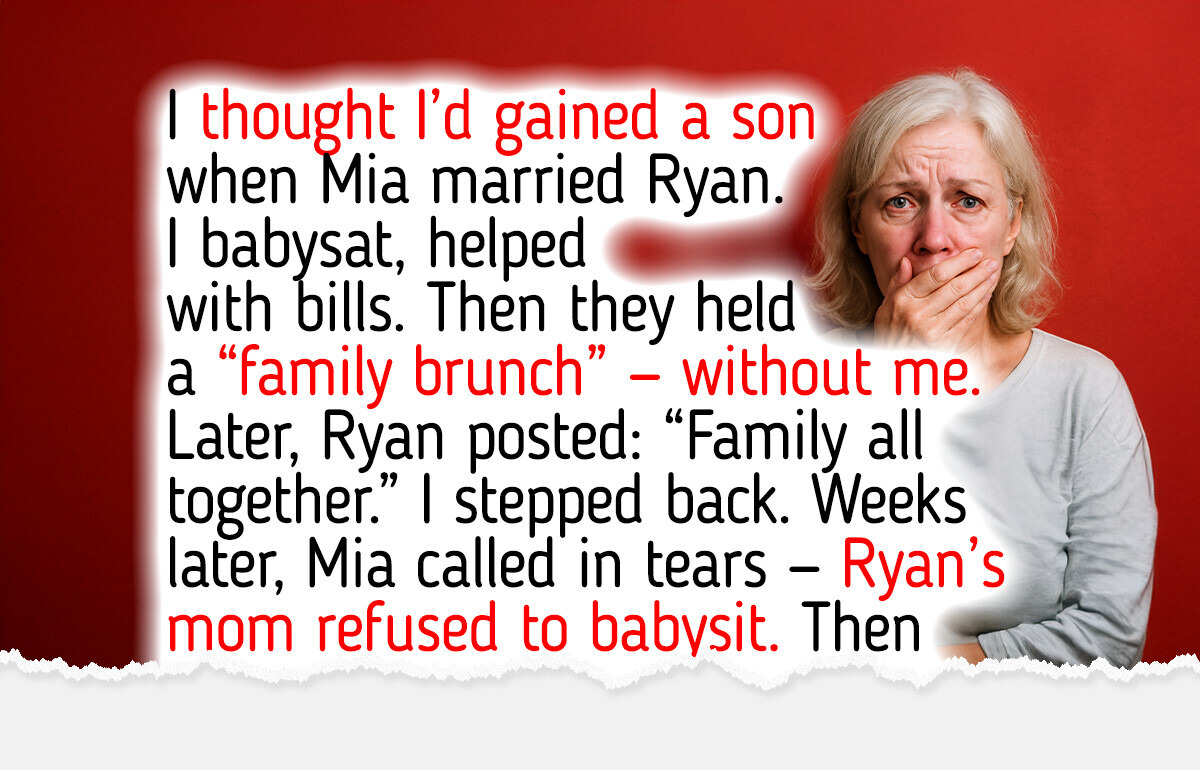
Family bonds are supposed to bring people closer together, but sometimes the very people we expect to treat us with love and respect end up drawing painful lines. One of our readers shared her story of how a single act from her son-in-law cut deep, but also sparked a turning point that none of them saw coming.
The letter with her own words:
Hi Bright Side!
I’m Carol, and I thought I’d gained a son when my daughter Mia married Ryan. I helped them move, watched their baby whenever they asked, and even covered some bills when money was tight. I never kept score — I just thought that’s what families did.
Then last month, Mia mentioned they were hosting a “family brunch.” I offered to bring dessert, but Ryan cut me off: “Oh, it’s just for my side this time.”
It stung. Later that night, I cried, wondering when I stopped being “family.” But the real blow came days later. Ryan posted photos from the brunch with his parents, captioned: “Nothing like family all together.”
I felt humiliated — like my years of support never mattered. So I quietly stepped back. No babysitting, no surprise groceries, no being on call. A few weeks later, Mia called in tears. Ryan’s mom had refused to babysit, and they were desperate.
For the first time, I said no. “You made it clear I’m not part of your family dinners. So maybe I’m not part of the childcare, either.”
There was silence on the line. Then Mia whispered, “Mom, I think I married the wrong man.”

Signs Your Son-in-Law May Be Controlling — And What You Can Do About It
Family gatherings should feel warm and supportive, but sometimes an outsider’s behavior can shake the foundation of those bonds. Many parents welcome their child’s spouse with open arms, only to slowly notice changes that are worrying, confusing, and painful. If you’ve ever felt like your daughter is drifting away, or that her partner’s influence is taking over, you’re not alone.
Here are the most common red flags of a controlling son-in-law — and some expert-backed strategies for protecting your relationship with your daughter while keeping the peace.
Red Flags You Shouldn’t Ignore
1. Isolation tactics
If your daughter seems more distant, it may not be by choice. Controlling partners often criticize family and friends, guilt their spouse for spending time away, or even start arguments before family visits. Over time, this can make your daughter think it’s easier not to go out at all.
2. He makes all the decisions
If your daughter hesitates to decide anything without his approval, that’s a warning sign. You may also notice that everything you say to her eventually gets back to him.
3. Nothing is ever his fault
Controlling partners are quick to blame others but take credit when things go well. This creates tension in the family, and often you’ll find yourself walking on eggshells.
4. Criticism and lies
Constant criticism, exaggerations, and even blatant lies are common tactics. He may also play the victim to deflect responsibility.
5. Your daughter seems like a different person
Perhaps the hardest sign to witness: she no longer sounds or acts like herself. Experts say unhealthy relationships can sometimes function like a ‘two-person cult,’ where one partner slowly reshapes their own personality just to keep the peace.

What You Can Do (Without Pushing Her Away)
Stay connected, even if it’s difficult. Isolation is a controller’s strongest weapon. Text, call, or invite her out — even if she sometimes refuses.
Avoid direct attacks. Confronting her partner head-on may backfire. Instead, focus on your love and concern for her.
Use “I” statements. For example: “I miss spending time with you,” instead of “He won’t let you see us.” This keeps the focus on your bond, not blame.
Share good memories. Remind her of who she was before the relationship changed. Looking at old photos or recalling happy family moments can help her reconnect with her true self.
Offer information gently. If you talk about controlling behaviors, frame it as knowledge, not accusation. For instance, “Sometimes partners use guilt to keep people close. Have you noticed that happening?”
Bring in trusted voices. Sometimes hearing similar concerns from multiple friends or relatives makes it harder for her to dismiss the warning signs.
Seek professional guidance. Therapists or support groups can give you strategies that are safe and effective for situations like this.
A woman revealed why she chose to stop paying her DIL’s medical bills in our previous letter. Read full story here: I Stopped Paying My DIL’s Medical Bills—I’m Not Her ATM Anymore.
Comments
Related Reads
Everything Seemed Normal in My Marriage Until I Found the Part of Our Story My Wife Never Mentioned

I Refuse to Let Selfish Parents Turn My Son’s Birthday Into a Family Disaster
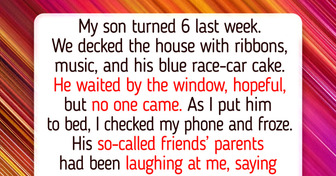
I Refuse to Let My SIL Turn My House Into a Free Buffet
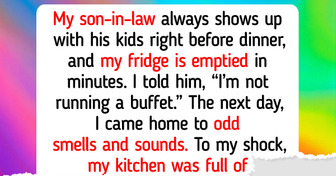
16 Touching Stories That Capture the Chaos and Beauty of Blended Families

12 Moment That Show Kindness Is the Glue That Keeps the World From Breaking Apart
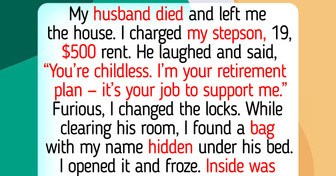
13 Double-Life Stories That Prove Even Those Closest to Us Have Secrets

15 Heart-Centered Moments of Human Kindness That Only Happen Once in a Blue Moon

I Refuse to Save the Father Who Abandoned Me—Now Everyone Calls Me Heartless
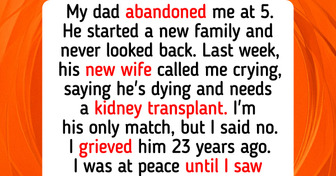
23 Times Quiet Kindness Won Over Human Ignorance in the Best Way

12 Heart-Touching Moments That Remind Us Workplace Loyalty and Empathy Don’t Pay the Bills

I Refused to Follow My Boss’s Dress Code—HR Had to Step In

I Refuse to Talk to My Friends After They Tricked Me Into Eating Meat—I’m Vegan
